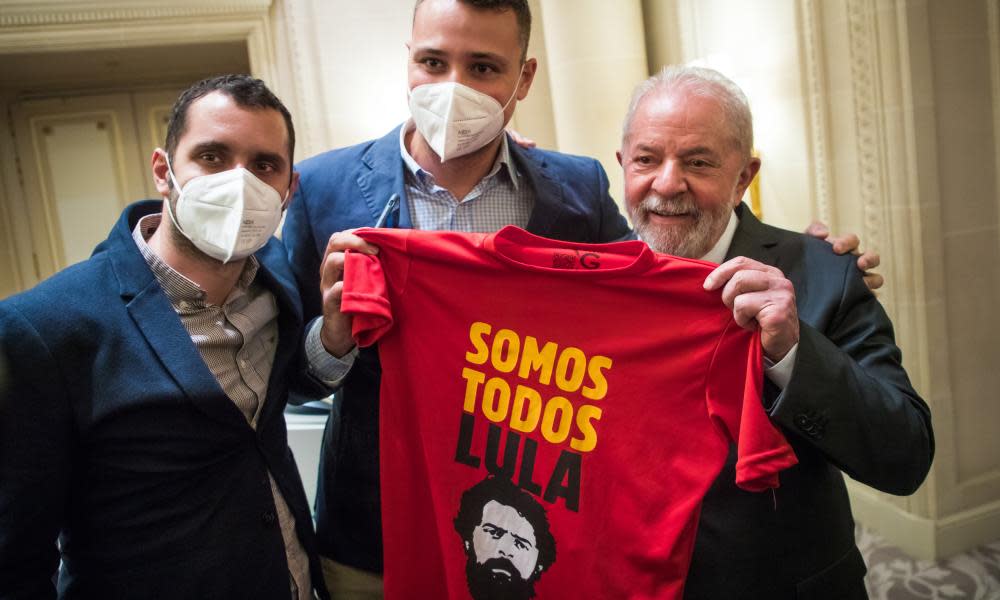‘Un grand monsieur’: Lula challenge to Bolsonaro finds welcome in Europe

- Oops!Something went wrong.Please try again later.
- Oops!Something went wrong.Please try again later.
- Oops!Something went wrong.Please try again later.
- Oops!Something went wrong.Please try again later.
- Oops!Something went wrong.Please try again later.
- Oops!Something went wrong.Please try again later.
It was a welcome fit for a president.
Republican Guards at the Élysée Palace. A standing ovation at the European parliament. A front-page interview in Spain’s top newspaper in which the visiting dignitary was hailed as a “cyclone” of energy.
“C’est un grand monsieur,” gushed the mayor of Paris, Anne Hidalgo, as she treated her “dear” foreign friend to a brasserie lunch on the east side of France’s capital.
The visitor was not a president, however – at least not since 2010, when Luiz Inácio Lula da Silva stepped down as Brazil’s leader with an approval rating of almost 90%.
Instead, Lula is now the leading candidate to unseat Brazil’s incumbent president, the rightwing populist Jair Bolsonaro, and was in Europe as part of a global effort to restore his reputation – and that of his country – after a torrid few years for both.
“I must come back to help Brazil recover its international prestige,” Lula, who is expected to challenge, and beat, Bolsonaro in next year’s election, told El País at the end of his week-long tour of Belgium, France, Germany and Spain.
Besides a contentious remark about Nicaragua’s authoritarian leader Daniel Ortega, Lula’s mission, which ended on Saturday, was widely seen as a triumph.
In Germany, the 76-year-old received a fist bump from Angela Merkel’s successor, Olaf Scholz, who Bolsonaro had shunned a few weeks earlier at the G20.
“I am delighted by our good discussions,” Scholz tweeted after meeting Lula, whose political comeback was enabled by the quashing of corruption convictions that saw him jailed for 580 days.
In France, Lula’s reception was even warmer, with Emmanuel Macron inviting the leftist to his palace in an unmistakable snub to Bolsonaro, with whom he has clashed over the dramatic acceleration of deforestation in the Amazon.
Lula’s former foreign minister, Celso Amorim, said that in almost six decades of diplomacy he could not recall such an honour being bestowed in similar circumstances.
“I never saw a former president and a potential candidate being received by the president of France the way he was,” said Amorim, who traveled with Lula and felt moved by the “affection” heaped on his friend and former boss.
Amorim claimed European leaders – including Macron, the Spanish prime minister, Pedro Sánchez, and the EU foreign policy chief, Josep Borrell – had treated Lula “as if he were a leader in power”.
“I think if they could vote, they would vote for Lula,” said Amorim, adding that he believed their hosts yearned for stability after Bolsonaro’s haywire tenure.
Lula’s continued renown stands in stark contrast to Bolsonaro’s international isolation, which deepened last week with claims Brazil had withheld figures showing a surge in Amazon deforestation during the Cop26 climate summit.
During his three years in power, Bolsonaro has alienated a succession of foreign partners, including China’s Communist party leaders, the US president, Joe Biden, and European leaders such as Macron and Merkel.
Related: Brazilian diplomats 'disgusted' as Bolsonaro pulverizes foreign policy
At October’s G20 Bolsonaro received a frosty reception and was filmed drifting aimlessly around the summit trying to engage waiters in conversation.
“It’s been an unprecedented diplomatic disaster,” said Celso Rocha de Barros, a pundit for the Folha de São Paulo newspaper.
Barros said Lula’s “absurd” Nicaragua comments had taken some of the shine off an otherwise successful tour and showed the Partido dos Trabalhadores (Workers party) needed to reflect on its stance towards leftist authoritarianism in Latin America.
Speaking to El País, Lula had cautioned against leaders becoming “little dictators” but wondered why Angela Merkel could stay in power for 16 years but not Daniel Ortega, who oversaw a deadly 2018 crackdown on protesters and jailed dozens of rivals before Nicaragua’s recent presidential election.
Even so, Barros thought Europe was desperate for a return to rationality in Brazil under “a normal politician” like Lula. By embracing Lula, European leaders were sending a message to Bolsonaro: “Look, we prefer this guy.”
“Lula represents a Brazil that had many problems – and still does – but that was at least trying to fix them,” Barros said.

